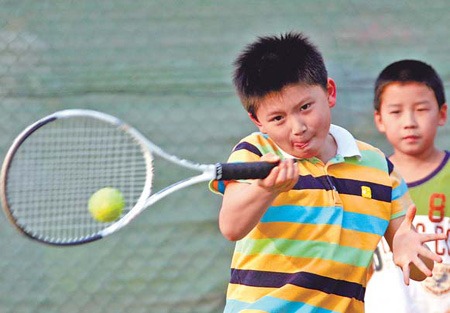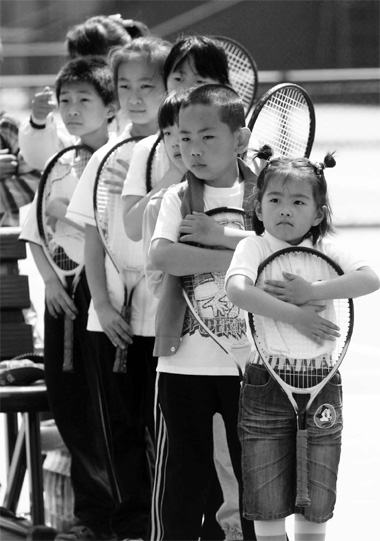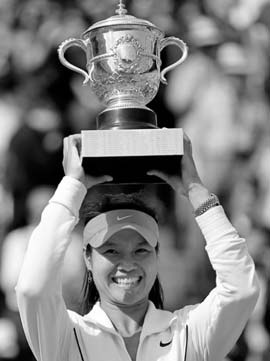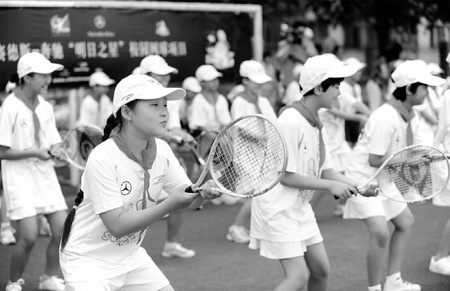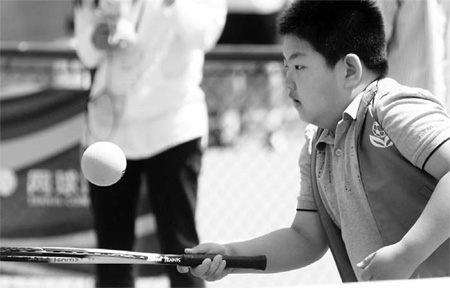Society
Children rushing to serve after Li's victory
Updated: 2011-06-10 07:55
By Cui Jia (China Daily)
|
|
French Open triumph inspires youngsters to take up tennis, reports Cui Jia in Beijing.
Fan Wentao's mobile phone started ringing as soon as Li Na dispatched Francesca Schiavone at the French Open to become China's first Grand Slam tennis champion.
The historic victory has resulted in a surge of interest among children in the sport.
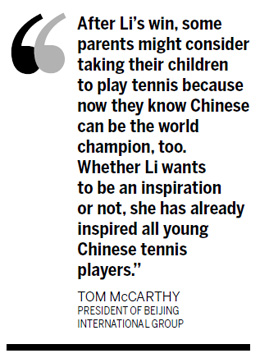 |
There is no doubt that Li's historic win on Saturday, and the media coverage in China, have created a tennis craze throughout the country, especially among youngsters who can see themselves emulating Li.
"Most of the parents who called said their children had never seen a tennis match until the French Open final was shown on national TV," Fan said. The champion's prize money of 1.2 million euros ($1.7 million, 11.37 million yuan) also surprised many of them, he said.
More than 116 million Chinese people watched the live broadcast of the women's final.
Song Nanxi, who is 13 and one of Fan's students, said Li's triumph made her extremely proud. Song and her partner won the Jiangxi junior doubles title last year.
"My classmates knew little about tennis and didn't think it was as cool as basketball," she said. "They always talk about (NBA player) Yao Ming, but no one knew about my idol, Maria Sharapova (Russian tennis player), or was impressed by my titles.
"Now they are not only proud of Li, who is my new role model, but some even ask me to teach them how to hit the ball like her, which made me very popular."
Impressing parents
Song started training under Fan when she was 7, and she said that what she loves most about tennis is the joy and fun it brings her.
Fan, 42 and a coach with the Jiujiang Sports Bureau, played professionally on the Jiangxi tennis team. Now he has more than 30 students ages 5 to 13 who have two-hour practice sessions after school five days a week. The bureau keeps an eye out for a young talent through such programs.
"Li's winning could inspire so many young people and, more important, their parents," Fan said. Some parents he had approached in the past refused to let their talented children play tennis because they didn't believe Chinese could go anywhere on the global stage.
When Fan started to teach children tennis in 1998, there was not one tennis court in Jiujiang. His students were trained on a concrete basketball court. Now many schools have standard tennis courts, and the sport can be introduced to students at a young age.
He said his students rarely have opportunities to play outside Jiangxi, but young players need to play in tournaments so they can improve. That requires sponsorships, and Fan said he hoped companies would contribute to cover the expenses for his students to play outside the province.
Fan said he has been trying to be a Western-style coach because he believes it's better for young players' long-term development.
"Chinese coaches often emphasize improving young players' techniques so they can physically play well, while foreign coaches believe attitude is more important," he said. "Li succeeded as an individual because she mastered both."
'A long process'
In Tianjin, hometown of Peng Shuai, who made it to the third round of women's singles at this year's French Open, parents have become more willing and able to support their children's tennis, said Tang Jiaying, vice-director of the Tianjin Tennis Sport Management Center.
The city owns eight professional sports schools teaching tennis to talented children under 10. Each school has 20 to 40 students, who compete in a citywide tournament for a spot on the Tianjin Tennis Team.
"Training young players is a long process and requires more than good technique to succeed," Tang said. "They need to have developed senses, such as the sense of attack, which can only be learned from playing matches, as well as having good coaches and even studying abroad."
If good 14-year-old players aren't nourished in that way, Tang said, they may drop out at 17. To encourage young players to play more games abroad when they qualify, the center pays for the round-trip air tickets while the player's family takes on the cost of accommodations.
'Only the beginning'
"Li's achievement validates the investment of everybody's time and energy every step of her way, and she laid the groundwork for China's young players," said Tom McCarthy, president of Beijing International Group (BIG), the official promoter of the China Tennis Association. "For China's tennis, it's only the beginning of climbing up the mountain, definitely not the top."
BIG has sponsored the "Swing for the Stars" junior tennis development program in China since 2008. The program has so far provided tennis training courses to about 2,500 amateur players who are 12 and younger - its primary focus - but also has reached more than 3,000 primary school students and about 30,000 university students nationwide.
According to the Chinese Tennis Association, the country has only about 500 registered tennis players between 12 and 18.
"The real result from Chinese young players requires patience," McCarthy said.
"Children from the Swing for the Stars program might not be able to perform internationally after eight years of training, but still you have to keep putting in the effort by getting them to play more matches internationally."
He said he doesn't expect Swing's school program to create real tennis stars in the future, but the students might want to continue playing recreationally because it is a fun game.
"After Li's win, some parents might consider taking their children to play tennis because now they know Chinese can be the world champion, too," he said. "Whether Li wants to be an inspiration or not, she has already inspired all young Chinese tennis players."
Children in China now can say they want to be Li instead of Liu Xiang, the 110-meter hurdles Olympic champion, or Yao Ming, McCarthy said. As more people are inspired to progress in tennis, the coaching business and sale of tennis-related products will certainly explode, he said.
'A new image'
Sun Jinfang, director of the China Tennis Administrative Center, gave a thumbs up to Li and said she expects the champion to help ensure a greater future for Chinese tennis.
"This win is truly a breakthrough in a sport that has been dominated mainly by players from Europe, Australia and the Americas," she said. "It is a massive source of pride for all Asians and it can serve as a great milestone for the development of Chinese tennis.
"Li announced herself as a professional player by pulling off a great game and showing high morale. She is a new image for Chinese sports."
The China Tennis Association has long focused on the women's doubles game, and its efforts were rewarded by three Grand Slam titles - the 2006 Australian Open and Wimbledon (Yan Zi and Zheng Jie in women's doubles) and the 2008 Australian Open (Sun Tiantian with Serb Nenad Zimonjic in mixed doubles). And now there's a women's singles champion, too.
Tennis is considered an elite sport in China and, while the number of players is growing, it still is less played than basketball, football, table tennis and other sports. In Sun Jinfang's eyes, Li's win is a huge boost to change that.
"The victory can have a great effect on Chinese tennis. I'm sure it will lead to a re-evaluation of the sport and inspire more youngsters to play tennis," Sun said.
As Li said Saturday after her win, "I hope that lots of kids see my performance and in their hearts they feel that one day they can be like me and do even better than me."
Li's option
Li is a bit of a rebel who has had differences with the State-run sports system.
She argued that to breed world champions, China needed to give tennis players greater independence and financial incentives. She did say, however, that the State-run system benefited her greatly, since her own family was unable to cover the expenses of training and competing.
In 2008, the China Tennis Association introduced an experimental policy that allowed players to opt out of the State system. Li was permitted to choose her own coach and decide which matches to play, but she had to give 8 percent of her match winnings to the association.
Sun Jinfang told Xinhua on Thursday, "We can let go of the athletes when they show they are capable of flying alone. It's just like our children, who will one day grow up and get married. Li Na's success may encourage more people to follow her path."
Yu Yilei contributed to this report.
|
Tennis fever is expected to spread across the country among young players, like these in Tianjin at a promotional event sponsored by the International Tennis Federation last month. The federation said it takes only one hour to learn some basic playing skills. Provided to China Daily |
|
Li Na after her French Open victory. Photo Credit / Goes Here |
|
Teenagers train at a tennis club in Shenyang, capital of Liaoning province in Northeast China. Dai Hai / for China Daily |
|
This youngster tries to get the feel of the racket against the ball at the promotional event in Tianjin. Provided to China Daily |
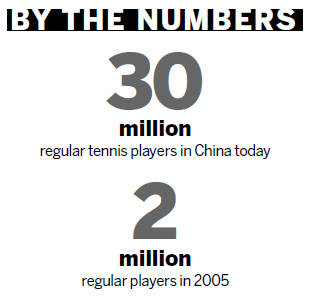
(China Daily 06/10/2011 page1)
E-paper

Pearl on the Yangtze
Wuxi is considered a town of natural beauty and its motto is "city of water and warmth".
Prose and consternation
Riding on a mystery train
Way of a warrior
Specials
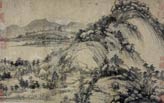
When two are one
After a separation of 360 years, Huang Gongwang's famous Dwelling in the Fuchun Mountains has been made whole again.

Wealth of difference
Rich coastal areas offer contrasting ways of dealing with country's development

Seal of approval
The dying tradition of seal engraving has now become a UNIVERSITY major
